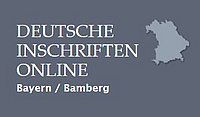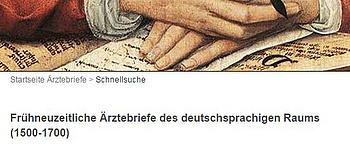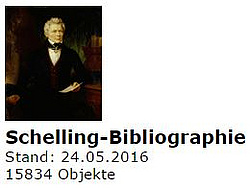Using digital technology to support research projects
The research projects of the Bavarian Academy of Sciences and Humanities use appropriate digital methods and tools to support their research activities. Even long-established research projects are adopting digital workflows and publishing content electronically in addition to or as an alternative to printed publications. The digital tools used here range from databases and virtual research environments (such as WissKI) to specialist content management and publishing tools (for example for dictionaries).
The different applications can be categorised as follows:
Exclusively digital and/or hybrid publication of findings
Nowadays, many researchers plan to publish research findings exclusively in digital formats. This is especially true for more recent projects. This does not exclude the subsequent publishing of (partial) findings at any time in the future.
The following research projects are shown here as examples. Other projects that exclusively publish content digitally include the Austrian Bible Translator and the Repertorium Academicum Germanicum.
Dictionary of Medieval Occitan (DOM)
Occitan, sometimes mistakenly referred to as Provençal, is an independent, time-honoured Romance language spoken by certain communities in southern France. The “Dictionary of Medieval Occitan” project is part of the Academies' Programme. The project focuses on editing the "Dictionnaire de l'occitan médiéval" (DOM) and, as such, is committed to providing the Romance research community and similar disciplines with a modern tool to support their work.
The publication was initially released in print. An online offering with supporting quotes and a continuously updated bibliography was then offered in addition to the print version. Today, the DOM is available exclusively online (link to database).
Visit the project website
German Inscriptions from the Middle Ages and the Early Modern Period - Special (Bamberg)

Inscriptions provide an excellent source of historical information. Texts inscribed on “durable” materials such as stone, wood, metal, textiles and glass provide valuable insights alongside manuscripts and printed works. This project develops editions of the post-Antique inscriptions from Bavaria up to the mid-17th century. The objective of each edition is to provide critical examination of the text, its historical context and commentary as a reference source for almost all disciplines of history as well as for linguistics and many other fields, including the preservation of historical artefacts.
Two volumes of the Bavarian branch are published exclusively online:
Medical Correspondence from the Early Modern Period
The “Medical Correspondence from the Early Modern Period” project compiles and makes available letters written by or to doctors in German-speaking countries between 1500 and 1700. Many thousands of these letters are kept in libraries and archives in Germany and abroad, and they provide a wealth of interesting information on the science, culture and everyday life of the times. The project is documenting these letters systematically for the first time and also provides a detailed table of contents.
The database is accessible to researchers around the world free of charge.
Visit the project website
Corpus of Baroque Ceiling Frescoes in Germany (CbDD)
The objective of the “Corpus of Baroque Ceiling Frescoes in Germany” (CbDD) project is to study and document the 5,000-plus examples of this visual medium found in current-day Germany and to interpret the paintings based on architectural, historical and art history contexts.
The research team utilises a virtual research environment known as Wissenschaftliche KommunikationsInfrastruktur (scientific communication infrastructure) or WissKI. All data is entered and stored on this IT platform, allowing researchers in the project to collaborate seamlessly from any location.
Visit the project website
Retrospective digital publication
The findings of many research projects that have been running for several years are now also being made available in digital formats.
The following projects are given as examples here. Other examples include the “Catalogue of Illustrated manuscripts from the Middle Ages” (KdiH) and the “Historical Atlas of Bavaria” projects.
Lexicon musicum Latinum medii aevi (LmL)
“Lexicon musicum Latinum medii aevi” is a dictionary of medieval Latin musical terminology up to the end of the 15th century. This extensive compilation of music theory literature from the Middle Ages is a key source for our understanding of medieval culture and the development of Western music.
The Lexicon musicum Latinum has been available online since 2011 (visit the dictionary network).
Visit the project website
German Inscriptions from the Middle Ages and the Early Modern Period (DIO)
Inscriptions provide an excellent source of historical information. Texts inscribed on “durable” materials such as stone, wood, metal, textiles and glass provide valuable insights alongside manuscripts and printed works. This project develops editions of the post-Antique inscriptions from Bavaria up to the mid-17th century. The objective of each edition is to provide critical examination of the text, its historical context and commentary as a reference source for almost all disciplines of history as well as for linguistics and many other fields, including the preservation of historical artefacts.
For some years now, the volumes published by the project have been fed into a database which is maintained by the Academy of Sciences and Literature in Mainz (link to the database).
Publication of research data
Expressed in the broadest terms, research data is the data used to validate research findings. It is an integral part of every research project and forms the basis for academic work.
Research data varies from project to project and can include source texts from an original body of work, digital reproductions used as a basis for transcription or editions, and bibliographical information on secondary literature.
In the digital world, this data represents a commitment to fostering open academic discourse (the open science movement) and making it much easier for existing findings to be reused.
The projects shown here are examples. Further projects include the Encyclopaedia of Assyriology and Middle-Eastern Archaeology and its Lemma database.
Schelling – Edition and Archive
The historical/critical edition of the writings of Schelling is the first scientific, textual criticism edition of Schelling’s work. It is designed as a complete edition and provides numerous contributions to the study of Schelling’s philosophy. This project is collecting and archiving all the important documents and studies relating to the life and thinking of Schelling.
These documented findings (data on letters, bibliography, people) are entered in a database which is freely available to everyone with an interest in the subject (link to database).
Visit the project website
Orlando di Lasso
The academy’s music history research group is editing the entire works of the composer to the Munich court Orlando di Lasso (1530/32–1594). Lasso conducted the Munich Court Orchestra, which achieved Europe-wide fame under his direction. He is credited with putting Munich on the map as a leading city of music. The edition of his works is divided into two sections: the “old” complete edition and a modern series.
The catalogue of his works has been fed into a database, which was developed in collaboration with the Bavarian State Library and offers a wide range of different search options (link to the database).
Visit the project website
Digital content management
Digitising texts, original works and source material used in research projects is standard practice today. However, there are also other digital processes and useful tools that can be used in certain projects. We present two examples in the following.
Bavarian and Franconian Dictionaries
Almost all source material for the Franconian and Bavarian dictionaries have been scanned and digitally archived in recent years. This was an important step to preserve these assets as some of the records and papers were 80 years old.
The digitised source material is now being fed into a content management system developed by the academy. In the past, researchers had to climb ladders to find source material. Today, the digital content management system allows users to quickly and easily view source material for specific dictionary entries on screen. All of which gives researchers more time to spend on the challenging task of evaluating vernacular sources and condensing them into dictionary articles.
Most of the source material of both dictionaries is available at the websites of the projects (see BWB digital resp. WBF digital). As part of the ongoing research you will find also an online tool for experts and informants to post their knowledge of the bavarian dialect.
See the Akademie Aktuell magazine (issue 01/2016) for more details (only available in german).
Ptolemaeus Arabus et Latinus
The “Ptolemæus Arabus et Latinus” project has been highlighting the importance of digital publications and the opportunities they offer since its inception in 2014 (website). It is an extremely challenging editing and cataloguing project as there is a huge amount of texts attributable to the astronomer and mathematician and these are all written in different languages and scripts.
The manifold connections between the descriptions of his works and manuscripts, transcripts and facsimiles can be more easily captured online. A fast, transparent table search enables users to access specific information within the large repository of data and compare facsimiles and transcripts – all of which makes it easier for users to critically analyse material. Furthermore, computational linguistic algorithms can be used to evaluate the digital edition, which means that the information can be reused more effectively.
For further information, see the Akademie Aktuell magazine (issue 01/2016) (only available in german)
Websites of the projects and institutes
All research projects and institutes of the Bavarian Academy of Sciences and Humanities will obtain their own website. There will also be published – depending of the project – research data (e.g. questionnaires of the bavarian and franconian dictionary) and further outcome (e.g. lists of literature and manuscript sources).
That ambitious service started in 2015 – and several websites are to be seen online:
2022
Schelling in München (1811–1841) | schelling.badw.de | 15.02.2022 |
Judentum in Bayern | judentum-in-bayern.badw.de | 10.02.2022 (without english translation) |
| Schelling-Forum | schelling-forum.badw.de | 04.02.2022 (without english translation) |
2021
Digitale Edition von Walter Burleys zwei frühen Kommentaren zur "Physik" des Aristoteles | walter-burley.badw.de | 19.10.2021 |
Kulturen politischer Entscheidung in der modernen Demokratie | demokratie.badw.de | 14.07.2021 (without english translation) |
| Wörterbuch der tibetischen Schriftsprache | wts.badw.de | 24.02.2021 |
2020
Adhoc-Arbeitsgruppe Zukunftswerte | 02.10.2020 | |
Frühneuzeitliche Ärztebriefe des deutschsprachigen Raums | 03.09.2020 | |
Corpus Vasorum Antiquorum | 29.04.2020 |
2019
Orlando di Lasso-Ausgabe | 01.10.2019 | |
Edition von Kommentaren zu den Sentenzen des Petrus Lombardus | 22.08.2019 (without english version) | |
Repertorium „Geschichtsquellen des deutschen Mittelalters“ | 05.07.2019 | |
Mittellateinisches Wörterbuch (MLW) | 05.06.2019 | |
Ad-hoc-AG Islam in Bayern | 26.02.2019 (without english version) | |
Mittelalterliche Bibliothekskataloge Deutschlands und der Schweiz | 22.01.2019 |
2018
Ernst Troeltsch-Gesamtausgabe | 05.12.2018 (without english translation) | |
Dialektologisches Informationssystem von Bayerisch-Schwaben | dibs.badw.de bzw. wbs.badw.de | 30.11.2018 (without english translation) |
Reallexikon der Assyriologie und Vorderasiatischen Archäologie | 28.11.2018 | |
Ad-hoc-Arbeitsgruppe Faktizität | 08.10.2018 | |
Repertorium Academicum Germanicum (RAG) | 05.10.2018 | |
Johannes Zacharias Actuarius | 04.10.2018 (without english translation) | |
Schmellers Bayerisches Wörterbuch | 24.07.2018 | |
Münchener Texte und Untersuchungen | 12.07.2018 (without english translation) | |
Überlieferung der deutschsprachigen Lieddichtung des Mittelalters | 12.07.2018 (without english translation) | |
Herausgabe der Schriften des Johannes von Damaskus | 06.06.2018 | |
Lexicon musicum Latinum medii aevi | 30.01.2018 |
2017
| Kommission für Semitische Philologie | 15.11.2017 | |
| Kommission für bayerische Landesgeschichte + Institut für Volkskunde | 11.10.2017 | |
| Herausgabe der Urkunden Kaiser Friedrichs II. | 25.9.2017 | |
Archäologische Untersuchungen und Ausgrabungen zur antiken Urbanität | 20.9.2017 | |
Forum Ökologie | 19.9.2017 | |
Forum Technologie | 26.4.2017 | |
Altokzitanisches Wörterbuch (DOM) | 30.3.2017 | |
Geodäsie (DGK) | 14.3.2017 | |
Der Österreichische Bibelübersetzer | 9.3.2017 | |
Erdmessung und Glaziologie | 22.2.2017 | |
Bayerisches Wörterbuch | 17.02.2017 |
2016
Fränkisches Wörterbuch | 15.12.2016 | |
Edition der Werke von Johannes Kepler | 13.12.2016 | |
Thesaurus Linguae Latinae | September 2016 | |
Vergleichende Archäologie römischer Alpen- und Donauländer | 26.4.2016 | |
Katalog der Illustrierten Handschriften des Mittelalters | 13.4.2016 | |
Max Weber-Gesamtausgabe | 5.2.2016 | |
Corpus der barocken Deckenmalerei in Deutschland | 2.2.2016 |
2015
Schelling – Edition und Archiv | 18.12.2015 |









